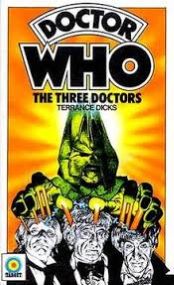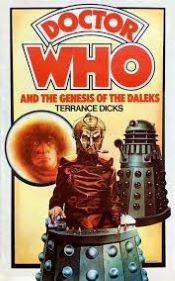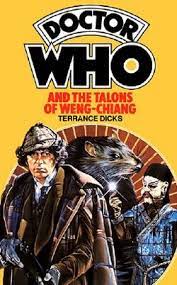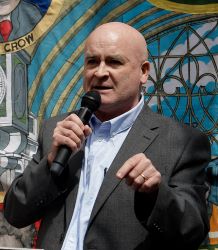
From downthetubes.net
If you were to draw up a list of great children’s authors of the 20th century, you’d no doubt end up with names such as Roald Dahl, Alan Garner, Tove Jansson, Clive King, C.S. Lewis, Astrid Lindgren, A.A. Milne, Philip Pullman and Rosemary Sutcliffe. But you probably wouldn’t think of including Terrance Dicks, who passed away in 2019 at the age of 84.
Dicks made his name on television as a scriptwriter and script editor. He was involved in TV shows like The Avengers (1961-69), Moonbase 3 (1973), Space 1999 (1975-77) and much-maligned ITV soap opera Crossroads (1964-88), and also in a raft of TV adaptations of classic literary works that the BBC broadcast on Sunday evenings and included Great Expectations (1981), Beau Geste (1982), The Hound of the Baskervilles (1982), Oliver Twist (1985), David Copperfield (1986-87) and Vanity Fair (1987). But his most famous TV work was with the BBC’s long-running science fiction / fantasy show Doctor Who, which kicked off in 1963 and has recently celebrated its 60th birthday with a series of TV specials featuring Scottish actor David Tennant, returning to the role of the Doctor after 13 years, and Rwandan-but-also-Scottish actor Ncuti Gatwa making his debut in the role too.
Yet I suspect it was as a writer of books, not TV shows, that Dicks left his greatest legacy. For he had a huge but unsung influence on the reading habits of British kids during the 1970s and 1980s.
Dicks served as script editor on Doctor Who from 1970 to 1975, when the title character was played by Jon Pertwee as an imperious, cape-and-bowtie-wearing, vintage car-driving, karate-chopping man of action. He also contributed the occasional script to the show during the tenures of Pertwee’s immediate predecessor (Patrick Troughton) and successors (Tom Baker and Peter Davison). However, it’s for his role as novelist-in-chief for Target Books’ Doctor Who series that I believe Dicks is most important. The Target series turned most of the Doctor Who TV adventures from the 1960s, 1970s and 1980s into neat, collectible paperbacks, with attractive and colourful covers that were often courtesy of fantasy-artist Chris Achilleos.

© Target Books / Estate of Chris Achilleos
Back then, the BBC seemed disinterested in repeating past episodes of Doctor Who. And if you were a fan of the show, as I was, there were no such things as whole-season box sets, Internet streaming or BBC iplayers, or indeed, DVDs or even video cassette tapes, to allow you to catch up with missed episodes. And you often missed them, because the show was broadcast early on Saturday evenings, and Saturday was a school-free day when you’d be out of the house doing stuff. Plus, there were many episodes you hadn’t seen because they’d been broadcast before you were even born…
It didn’t help that the BBC wiped many of the early episodes featuring the first two Doctors, William Hartnell and Patrick Troughton, assuming that the tapes served no financial or cultural function and only took up unnecessary space in their storerooms. Considering how the BBC has made millions since then selling the show and its memorabilia to worldwide audiences, they must be really kicking themselves about destroying those episodes now.
So, in those days, if you were a ten-year-old wanting to experience past adventures with past Doctors, your only option was to buy the Target novelisations, the majority of which were penned by Dicks in his simple, no-nonsense, fast-moving prose. Admittedly, I think their quality tailed off a bit in later years as demand for them increased, and the backlog of un-novelised adventures grew greater, forcing Dicks to churn them out at a faster rate, but some of the ones he wrote in the 1970s were great and, even without the TV show behind them, would have stood up as excellent children’s books in their own right: for example, The Auton Invasion (1974), The Abominable Snowmen (1974), The Terror of the Autons (1975), The Three Doctors (1975), The Genesis of the Daleks (1976) and The Talons of Weng-Chiang (1977).
The only problem with Dicks’ books was that they tended to make the stories seem much more spectacular on the page than how they’d appeared on the screen. One of Dicks’ paragraphs, coupled with a child’s imagination, could conjure up incredible settings – teeming utopian cities, vast gladiatorial arenas and huge bustling spaceports. Whereas on TV these were really poky little BBC studio-sets, bare and shaky and obviously low-budget. Meanwhile, the immense alien deserts, wastelands and battlefields evoked by Dicks’ prose were invariably, on TV, a big quarry outside London where the show seemed to do 80% of its outdoor filming. Years later, when you finally got to see those old TV episodes that you’d previously only known through reading the novelisations, they disappointingly looked a bit rubbish.
At ten years old, and as a budding writer, I decided to follow Dicks’ example and write my own Target Books Doctor Who novelisation. I made up my own TV adventure in my head and then wrote it as a book, by hand, in a hundred-page jotter. I even added my own black-and-white illustrations every dozen pages or so. The cover (again drawn by me) showed a giant, gauntleted fist grabbing hold of planet Earth. The book was called Bloodlust of the Sontarans. The Sontarans were war-like, potato-headed aliens who at that point had appeared on the show a couple of times to menace Jon Pertwee and Tom Baker’s Doctors. When it was relaunched in 2005, the Sontarans were reintroduced during the Doctor-ship of David Tennant and one of them, played by Dan Starkey, even became a semi-regular character while Matt Smith and Peter Capaldi occupied the lead role.

© Target Books / Estate of Chris Achilleos
Two years later, I decided to produce my second Doctor Who novelisation, and for this one I became positively hi-tech. My parents had given me a typewriter for Christmas, so with that I banged out about 130 paperback-sized pages and then taped them together. There were no illustrations in this volume, but I drew a colourful, hopefully Chris Achilleos-style cover showing Tom Baker getting his head fried by a futuristic brain-washing machine. This I titled Destruction of the Daleks and, yes, it featured the show’s number-one villains, the demented, eye-stalked, kitchen-plunger-waving, Nazi pepperpots, the Daleks. The premise of this novel was that the Daleks had started to be killed off by a newly evolved virus and were going to extreme lengths to locate a cure for it. I was peeved when, several years later, the BBC seemed to nick my idea and used it as the basis for an official Doctor Who TV adventure, Resurrection of the Daleks, which starred Peter Davison as the fifth Doctor. I should have sued.
As I said, I’m positive Dicks’ books got a lot of kids (who otherwise would have been glued to their TV sets all the time) reading, even if it was the TV connection that got them to open the books in the first place. And as I’ve suggested in the previous two paragraphs, he was also a big influence on kids who wanted to become writers themselves. Decades later I still write stuff, and get the occasional thing published, and when I use certain words I find myself reminded of Dicks, who originally showed me how to use those words in certain ways. For example, ‘croak’ instead of ‘said’, to describe a raspy voice – that came from Dicks using it in reference to the Daleks, who regularly ‘croaked’ the word “Exterminate!” Or ‘wheezing’ or ‘groaning’ to describe a particular type of sound, like the one made by the Doctor’s space / time-ship, the Tardis, when it was materialising or dematerialising.
I ended up with a row of colourful Target / Doctor Who novels on my bookshelf. I assumed it was just me who was geeky enough to possess such a collection, but then one day in the late 1980s I happened to be in the Edinburgh flat of one Dougie Watt, whom I knew fairly well back then and who is now a novelist and historian. I noticed a similar row of Target books on his bookshelves too. However, as Doctor Who was definitely not considered cool in those days, and labelling yourself a Doctor Who fan was about as damaging to your street credibility as announcing that you took a shower once a month or your all-time favourite musical act was Rick Astley, I tactfully pretended I hadn’t noticed them and avoided Who-shaming my friend.
After being relaunched in the 21st century, Doctor Who has had many established writers of books, comics, television and films falling over themselves to write either TV-show episodes or spin-off novels for it: for instance, Dan Abnett, David Bishop, Eoin Colfer, Jenny Colgan, Frank Cottrell Boyce, Paul Cornell, Neil Cross, Richard Curtis, Neil Gaiman, Mark Gatiss, A.L. Kennedy, Jamie Mathieson, Michael Moorcock, Patrick Ness, Kim Newman, Simon Nye, Robert Shearman and Toby Whitehouse. In addition, the three ‘showrunners’ who’ve helmed ‘Nu-Who’ so far, Russell T. Davies, Stephen Moffat and Chris Chibnall – Davies is currently back in charge – all made their names as writers originally. So it’s a writers’ show through and through. And I suspect that reading Terrance Dicks’ books back in their childhood helped a good number of those people find their calling as writers.
Meanwhile, Russell T. Davies, if you’re reading this and fancy commissioning a script for the next season of Doctor Who with the title Bloodlust of the Sontarans, give me a call.

© Target Books / Estate of Chris Achilleos





